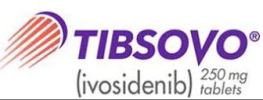TIBSOVO (ivosidenib) tablets
Agios Pharmaceuticals
RealTime IDH1 Assay
Abbott Laboratories
INDICATION: Treatment of adult patients with relapsed or refractory acute myeloid leukemia (AML) with a susceptible isocitrate dehydrogenase-1 (IDH1) mutation as detected by an FDA-approved test
ADDRESSING UNMET NEED:
- AML is rapidly progressing cancer; ~19,520 people will be diagnosed with ~10,670 deaths in 2018
- Targeted therapy for patients with relapsed or refractory AML who have an IDH1 mutation
MECHANISM OF ACTION: Targets mutant isocitrate dehydrogenase 1 (IDH1) enzyme; decreases abnormal production of the oncometabolite 2-hydroxyglutarate (2-HG), leading to differentiation of malignant cells.
EFFICACY:
- Open-label, single-arm, multicenter clinical trial, n=174 adult patients with relapsed or refractory AML with IDH1 mutation confirmed using Abbott RealTime TM IDH1 Assay
- Endpoints: Rate of complete remission (CR) plus complete remission with partial hematologic recovery (CRh), the duration of CR+CRh, rate of conversion from transfusion dependence to transfusion independence
- 32.8 % experienced a CR orCRh lasting median 8.2 months
- 37% went at least 56 days without requiring transfusion
SAFETY:
- Common side effects: Fatigue, increase in white blood cells, joint pain, diarrhea, shortness of breath, swelling in the arms or legs, nausea, pain or sores in the mouth or throat, irregular heartbeat (QT prolongation), rash, fever, cough and constipation
- Boxed warning: Differentiation syndrome can occur and can be fatal if not treated
- Other serious warnings: QT prolongation, Guillain-Barré syndrome
REGULATORY PATHWAY: NDA
- Fast Track and Priority Review designations, Orphan Drug designation
- Exempt from pediatric requirements
- Postmarketing requirements: long-term safety, PK/PD assessments

KISQALI (ribociclib) tablets
Novartis
EXPANDED INDICATION: KISQALI in combination with:
- an aromatase inhibitor for the treatment of pre/perimenopausal or postmenopausal women, with hormone receptor (HR)-positive, human epidermal growth factor receptor 2 (HER2)-negative advanced or metastatic breast cancer, as initial endocrine-based therapy
or
- fulvestrant for the treatment of postmenopausal women with HR-positive, HER2-negative advanced or metastatic breast cancer, as initial endocrine based therapy or following disease progression on endocrine therapy
ADDRESSING UNMET NEED:
- First cancer drug approval through new oncology review pilot that enables greater development efficiency
- Aim to make development and review of cancer drugs more efficient, while improving FDA’s rigorous standard for evaluating efficacy and safety
- FDA start evaluating clinical data as soon as trial results become available, enabling FDA to be ready to approve the new indication upon filing of a formal application
EFFICACY AND SAFETY:
- In combination with an AI for pre/perimenopausal women: Clinical trial, n=495, Progression Free Survival (PFS) was longer for patients taking Kisqali plus an AI (median PFS of 27.5 months) compared to placebo plus an AI (median PFS of 13.8 months)
- In combination with fulvestrant: Clinical trial, n=726, PFS longer for patients taking Kisqali plus fulvestrant (median PFS of 20.5 months) compared to placebo plus fulvestrant (median PFS of 12.8 months)
- Common side effects: Infections, neutropenia, leukopenia, headache, cough, nausea, fatigue, diarrhea, vomiting, constipation, hair loss and rash
- Warnings: QT prolongation, serious liver problems, low white blood cell counts that may result in infections that may be severe, and fetal harm
REGULATORY PATHWAY: Prior Approval Supplement utilizing two new pilot programs
- Real-Time Oncology Review (RTOR): Early submission of data that are the most relevant to assessing safety and effectiveness of the product. Then, when the sponsor submits the application with the FDA, the review team will already be familiar with the data and in a better position to conduct a more efficient, timely, and thorough review.
- Assessment Aid to organize submission into structured format to facilitate review
- Priority Review and Breakthrough Therapy designation
Updated LABEL not available at this time
TPOXX (tecovirimat) capsules
Siga Technologies
Developed in conjunction with U.S. Department of Health and Human Services’ Biomedical Advanced Research and Development Authority (BARDA)
INDICATION: Treatment of human smallpox disease caused by variola virus in adults and pediatric patients weighing at least 13 kg
ADDRESSING UNMET NEED:
- First drug with an indication for treatment of smallpox
- Addressing the risk of bioterrorism
MECHANISM OF ACTION: Antiviral drug against variola (smallpox) virus
EFFICACY:
- Has not been determined in humans because adequate and well-controlled field trials have not been feasible, and inducing smallpox disease in humans to study the drug’s efficacy is not ethical
- Effectiveness based on results of adequate and well-controlled animal efficacy studies of non-human primates and rabbits infected with non-variola orthopoxviruses
- Primary efficacy endpoint: Survival
- Statistically significant improvement in survival relative to placebo
SAFETY:
- Evaluated in 359 healthy human volunteers without smallpox infection
- Most frequently reported side effects: Headache, nausea and abdominal pain
REGULATORY PATHWAY: NDA, approved under the FDA’s Animal Rule
- Fast Track and Priority Review designations, Orphan Drug designation
- Awarded Material Threat Medical Countermeasure priority review voucher

XTANDI (enzalutamide) capsules
Astellas
SUPPLEMENTAL INDICATION: Treatment of patients with castration-resistant prostate cancer (CRPC)
ADDRESSING UNMET NEED: Broadens indicated patient population to include patients with non-metastatic CRPC (NM-CRPC) in addition to previously approved metastatic CRPC
EFFICACY:
- Randomized, multicenter clinical trial, n= 1,401 patients. XTANDI vs. placebo; patients continued on gonadotropin-releasing hormone (GnRH) therapy or had prior bilateral orchiectomy
- Major efficacy outcome: Metastasis-free survival (MFS)
- Statistically significant improvement: Median MFS of 36.6 vs. 14.7 months (HR 0.29; 95% CI: 0.24, 0.35; p<0.0001).
SAFETY:
- Most common adverse reactions: Asthenia/fatigue, hot flush, hypertension, dizziness, nausea, and fall
REGULATORY PATHWAY: sNDA
- Postmarket requirements: Collect and analyze all cases of new (non-prostate) malignancies identified in treated patients on an annual basis
 Centre de Transfusion Sanguine des Armées Freeze Dried Plasma (French FDP)
Centre de Transfusion Sanguine des Armées Freeze Dried Plasma (French FDP)
U.S. Department of Defense (DoD)
USE: Treatment of hemorrhage or coagulopathy during an emergency involving agents of military combat when plasma is not available or when use of plasma is not practical
ADDRESSING UNMET NEED:
- Importance of access to freeze-dried plasma in initial efforts to control hemorrhage from battlefield trauma
- Collaborative program with DoD to expedite development and availability of safe and effective, priority medical products for military service members
DESCRIPTION:
- Lyophilized, leukocyte-depleted, pathogen-reduced (Intercept-treated), pooled
apheresis Fresh Frozen Plasma product collected from volunteer donors and manufactured by the Centre de Transfusion Sanguine des Armées - Following reconstitution with water for injection, it can be administered intravenously
DATA COLLECTION: Intended to support the safety of the use of French FDP in combat settings
- Patient survival until transfer of care
- Patient survival at Day 30 following treatment with French FDP
- Adverse events related to French FDP administration until transfer of care
REGULATORY PATHWAY: Emergency Use Authorization
- DoD request and declaration by Secretary of the Department of Health and Human Services
Image credits: Agios, Novartis, Siga, Astellas, FDA

